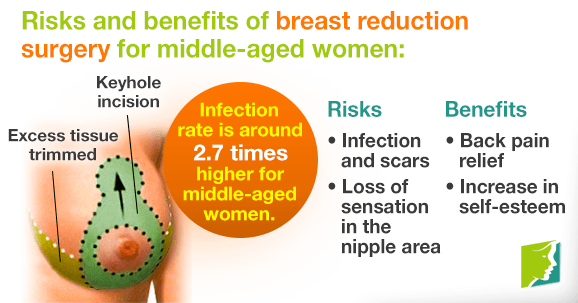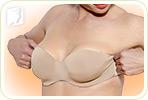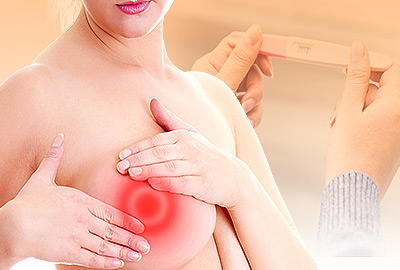Some women feel the need for breast reduction surgery as a result of having large or asymmetrical breasts. Problems caused can range from physical pain, such as backache, to psychological issues caused by the embarrassment of having two breasts of differing sizes. Other problems include not being able to play certain sports or being unable to wear fashionable clothes. However, some middle-aged women are fearful of surgery, thinking that it is more dangerous with age. Read on to discover more information about the health implications involved in breast reduction surgery for middle-aged women.
What Does Breast Reduction Surgery Entail?
Breast reduction surgery involves removing the excess fat and skin from the breast, altering the shape. The nipples are normally removed at the beginning and then repositioned at the end. Visible scars are a standard result of this operation, but size and redness of the scar differs from woman to woman. In most cases, the wounds heal normally and there are no further problems, but there is a risk of infection and badly-healed wounds following the operation. Therefore, it is best to discuss with your doctor the risk of complications likely to affect you before you go ahead with breast reduction surgery.
Risks and Benefits for Middle-aged Women
Breast reduction surgery can involve different pros and cons depending on a woman's age.
Infection and scars
Certain studies have shown that women over 50 have an increased risk of infection following breast reduction surgery. On average, the infection rate is around 2.7 times higher for this age group. They also seems to have more problems with wound-healing, and this can result in unsightly scarring. It is not entirely clear why this is the case, but it is thought to be at least partially because of hormone deficiency. Indeed, infection rates were lower among women taking hormone replacement therapy (HRT) and higher among those who had had a hysterectomy.
Loss of sensation
As with all people who have breast reduction surgery, there is a risk of a loss of sensation in the nipple area. This can make intimate contact with a partner less pleasurable for some women, so consideration needs to be given as to whether this is a risk worth taking.
Improve self-esteem
You are likely to have a very good outcome from breast reduction surgery: over 90% of women feel they have made the right decision in getting the operation. You may feel better about your appearance and be more comfortable with various activities. Pain or skin symptoms may disappear. You may need to wear a special supportive bra for a few months to help reshape your breasts.
Satisfaction with your new image should continue to grow as you recover, and you may find that you have a better proportioned figure. The results of this procedure are generally permanent.
Having breast surgery in middle age is not much more dangerous than it is for younger people. There are a couple of risks attached, but this is not to say that many middle-aged women do not have breast surgery free of subsequent scarring and infection. In the end, it is up to each woman to weight up the risks and benefits, and talking to a doctor could help with this.
Click on the following link to learn more about how to handle breast tenderness.
Sources
- American Society of Plastic Surgeons. (2011). Breast Reduction Surgery Has Higher Complication Rate in Older Women. Retrieved September 11, 2014, from http://www.plasticsurgery.org/news/past-press-releases/2011-archives/breast-reduction-surgery-has-higher-complication-rate-in-older-women.html
- The British Association of Aesthetic Plastic Surgeons. (n.d.). Breast Reduction: Reduction Mammoplasty (breast reduction). Retrieved September 11, 2014, from http://baaps.org.uk/procedures/breast-reduction
- Shermak, M.A. et al. (2011). Increasing age impairs outcomes in breast reduction surgery. Plastic and reconstructive surgery, 128(6), 1182-1187. doi: 10.1097/PRS.0b013e318230c467




